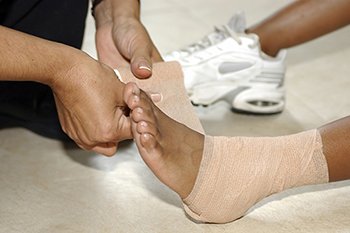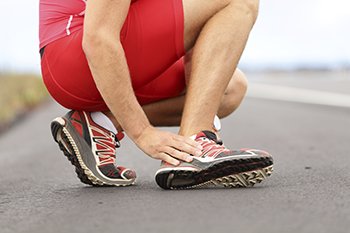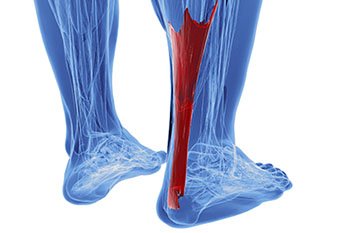Freehold (732) 294-9393
Freehold (732) 294-9393

Located in Freehold, NJ, podiatrist Dr. Henry J. Miller strives to supply patients with quality treatment and care of the foot, ankle, and lower leg. Dr. Miller has served the Monmouth County area since 1993, providing treatment for a variety of podiatric conditions including bunions, corns, calluses, heel pain, and ingrown toenails. He is certified by the American Board of Foot and Ankle Surgery. Also certified by the Council for Medical Education and Testing (CMET) in wound healing, Dr. Miller specializes in diabetic foot care and wound care. The office’s friendly staff welcomes new patients of all ages, promising to deliver a pleasant office visit. The practice aims to work with patients to ensure that they fully understand their conditions and the treatments that best suit them.
Dr. Henry J. Miller accepts a variety of insurance plans. Call (732) 294-9393 to schedule an appointment today!

One of the most common causes of pain felt in the ankle region is a sprain. When ligaments in the ankle are torn or overstretched, an ankle sprain is likely to occur. There are three types of sprains that may develop: mild, moderate, and severe. In the case of a mild ankle sprain, the ankle is stable. The ligaments, however, are stretched. A moderate sprain consists of one or more ligaments being partially torn, and there’s limited movement. Severe ankle sprains include one or more torn ligaments, the ankle being unstable, and an inability to move the foot.
Ankle sprains are a common occurrence for those who are particularly active in sports. Volleyball, basketball, and soccer are just a few of the types of sports that are prone to producing ankle injuries, including ankle sprains. Many athletes have found that compressing the ankle by wrapping it in bandages is an effective method for helping to prevent injury. Exercising using a balance board has also been found useful for strengthening the ankle and increasing its stability.
If you’re experiencing ankle pain and believe you might have a sprain, it’s highly recommended that you consult with a podiatrist for a proper diagnosis and advised treatment plan.
 Ankle pain may occur due to a number of different reasons, including obesity. Patients who are obese may experience ankle pain more commonly than others because of the additional weight being carried by their feet. Athletes are also common patients who will likely experience some form of ankle pain. Since athletes are often involved in sporting activities that may result in them falling awkwardly and rolling their ankle or tearing the ligaments in their ankle, it’s important that they take certain precautions before beginning said activity.
Ankle pain may occur due to a number of different reasons, including obesity. Patients who are obese may experience ankle pain more commonly than others because of the additional weight being carried by their feet. Athletes are also common patients who will likely experience some form of ankle pain. Since athletes are often involved in sporting activities that may result in them falling awkwardly and rolling their ankle or tearing the ligaments in their ankle, it’s important that they take certain precautions before beginning said activity.
Ankle pain can often be accompanied by symptoms such as redness, swelling, stiffness and warm in the affected area. Pain can be described differently depending on the condition; short, stabbing pain and a dull ache are some examples. If such symptoms are persistent and do not improve after time, be sure to schedule an appointment with your local podiatrist.
Wearing proper footwear and athletic guards, as well as stretching before a sporting event, are great ways to help prevent injury to the ankle. If by chance you do sustain ankle injury, there are certain practices you can perform to help alleviate the discomfort. Icing the affected area, compressing the ankle, keeping the ankle elevated, and getting plenty of rest are all methods that may help lessen the pain that can come with having an ankle injury.
If you believe you’re experiencing an ankle injury, it’s highly recommended that you consult with a podiatrist for professional care and an advised treatment plan.

A condition that often results in serious heel pain is known as Achilles tendonitis. This condition may form when the Achilles tendon is damaged as a result of overuse. This particular injury can be very serious, as the Achilles tendon’s main function is to connect the lower half of the calf muscles to the heel bone. If this tendon becomes damaged, it may result in difficulty walking and completing everyday tasks, as well as cause extreme discomfort and pain.
It’s more common for athletes to experience Achilles tendon injuries, as they’re more likely to be participating in activities that would call for repetitive movement, such as running or jogging. This kind of repetitive movement over time is likely to cause stress on the tendon. When athletes abruptly increase their performance level without properly training or warming up their bodies, they may also injure the Achilles tendon, which may lead to inflexibility in the calf muscles.
In order to prevent this kind of injury, it’s suggested to perform stretches—particularly focused on the calf region—about one to three times a day to keep the area flexible. Focusing on building strength in your calves is also advised. If you believe you’ve injured your Achilles tendon, there are some actions you can take to help alleviate the discomfort. Icing and massaging the affected area may help to calm the pain, as well as practicing light stretches.
If you’re having difficulty walking or icing the area does not alleviate the pain, it’s highly advised that you speak with a podiatrist for professional care and an advised treatment plan.
1000 West Main Street
Freehold, NJ 07728
(732) 294-9393
| Mon: | 9:00 am - 12:00 pm |
| Tues: | 2:00 pm - 6:00 pm |
| Wed: | 9:00 am - 12:00 pm |
| Thur: | 2:00 pm - 6:00 pm |
| Fri: | 9:00 am - 12:00 pm |
| Sat: | By Appointment Only |